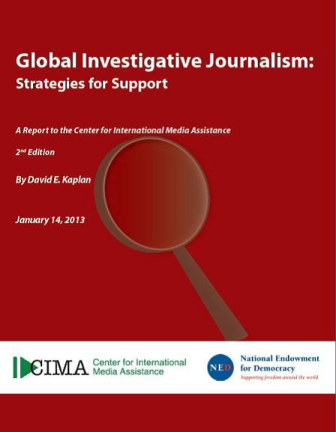While definitions of investigative reporting vary, among professional journalism groups there is broad agreement of its major components: systematic, in-depth, and original research and reporting, often involving the unearthing of secrets. Others note that its practice often involves heavy use of public records and data, with a focus on social justice and accountability.
 Story-Based Inquiry, an investigative journalism handbook published by UNESCO, defines it thus: “Investigative journalism involves exposing to the public matters that are concealed–either deliberately by someone in a position of power, or accidentally, behind a chaotic mass of facts and circumstances that obscure understanding. It requires using both secret and open sources and documents.” The Dutch-Flemish investigative journalism group VVOJ defines investigative reporting simply as “critical and in-depth journalism.”
Story-Based Inquiry, an investigative journalism handbook published by UNESCO, defines it thus: “Investigative journalism involves exposing to the public matters that are concealed–either deliberately by someone in a position of power, or accidentally, behind a chaotic mass of facts and circumstances that obscure understanding. It requires using both secret and open sources and documents.” The Dutch-Flemish investigative journalism group VVOJ defines investigative reporting simply as “critical and in-depth journalism.”
Some journalists, in fact, claim that all reporting is investigative reporting. There is some truth to this—investigative techniques are used widely by beat journalists on deadline as well as by “I-team” members with weeks to work on a story. But investigative journalism is broader than this–it is a set of methodologies that are a craft, and it can take years to master. A look at stories that win top awards for investigative journalism attests to the high standards of research and reporting that the profession aspires to: in-depth inquiries that painstakingly track looted public funds, abuse of power, environmental degradation, health scandals, and more.
Sometimes called enterprise, in-depth, or project reporting, investigative journalism should not be confused with what has been dubbed “leak journalism”–quick-hit scoops gained by the leaking of documents or tips, typically by those in political power. Indeed, in emerging democracies, the definition can be rather vague, and stories are often labeled investigative reporting simply if they are critical or involve leaked records. Stories that focus on crime or corruption, analysis, or even outright opinion pieces may similarly be mislabeled as investigative reporting.
Veteran trainers note that the best investigative journalism employs a careful methodology, with heavy reliance on primary sources, forming and testing a hypothesis, and rigorous fact-checking. The dictionary definition of “investigation” is “systematic inquiry,” which typically cannot be done in a day or two; a thorough inquiry requires time. Others point to the field’s key role in pioneering new techniques, as in its embrace of computers in the 1990s for data analysis and visualization. “Investigative reporting is important because it teaches new techniques, new ways of doing things,” observed Brant Houston, the Knight Chair of Journalism at the University of Illinois, who served for years as executive director of Investigative Reporters and Editors. “Those techniques blend down into everyday reporting. So you’re raising the bar for the entire profession.”
 Excerpted from Global Investigative Journalism: Strategies for Support, David E. Kaplan, Center for International Media Assistance, 2013. Kaplan is executive director of the Global Investigative Journalism Network, Kaplan is executive director of the Global Investigative Journalism Network. He has worked as an investigative journalist for more than 35 years, reported from two dozen countries, and won or shared more than 25 awards.
Excerpted from Global Investigative Journalism: Strategies for Support, David E. Kaplan, Center for International Media Assistance, 2013. Kaplan is executive director of the Global Investigative Journalism Network, Kaplan is executive director of the Global Investigative Journalism Network. He has worked as an investigative journalist for more than 35 years, reported from two dozen countries, and won or shared more than 25 awards.